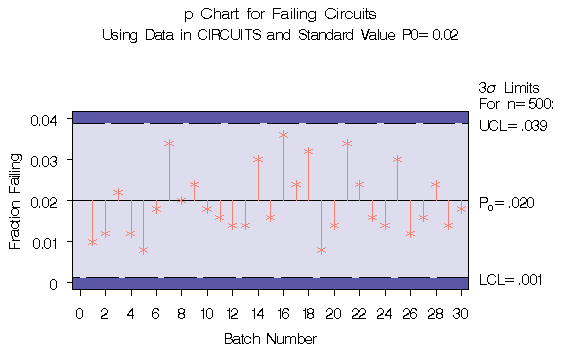Chapter Contents
Previous
Next
|
Chapter Contents |
Previous |
Next |
| PCHART Statement |
| See SHWPEX2 in the SAS/QC Sample Library |
In some situations, a standard (known) value (p0) is available for the expected proportion of nonconforming items, based on extensive testing or previous sampling. This example illustrates how you can specify p0 to create a p chart.
A p chart is used to monitor the proportion of failing circuits in the data set CIRCUITS, which is introduced at "Creating p Charts from Count Data" . The expected proportion is known to be p0=0.02. The following statements create a p chart, shown in Output 38.2.1, using p0 to compute the control limits:
title1 'p Chart for Failing Circuits';
title2 'Using Data in CIRCUITS and Standard Value P0=0.02';
symbol v=star c=salmon;
proc shewhart data=circuits;
pchart fail*batch / subgroupn = 500
p0 = 0.02
psymbol = p0
nolegend
needles
cframe = lib
cinfill = bwh
cneedles = salmon;
label batch = 'Batch Number'
fail = 'Fraction Failing';
run;

|
Alternatively, you can specify p0 using the variable _P_
in a LIMITS= data set,*
as follows:
data climits;
length _var_ _subgrp_ _type_ $8;
_p_ = 0.02;
_subgrp_ = 'batch';
_var_ = 'fail';
_type_ = 'STANDARD';
_limitn_ = 500;
run;
proc shewhart data=circuits limits=climits;
pchart fail*batch / subgroupn = 500
psymbol = p0
nolegend
needles;
label batch ='Batch Number'
fail ='Fraction Failing';
run;
The bookkeeping variable _TYPE_ indicates that _P_ has a standard value. The chart produced by these statements is identical to the chart in Output 38.2.1.
|
Chapter Contents |
Previous |
Next |
Top |
Copyright © 1999 by SAS Institute Inc., Cary, NC, USA. All rights reserved.